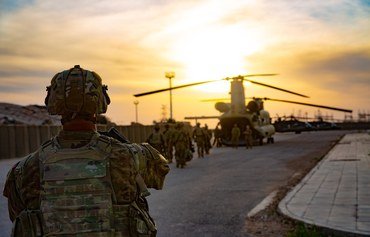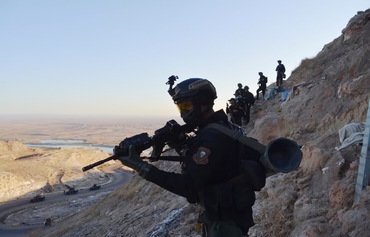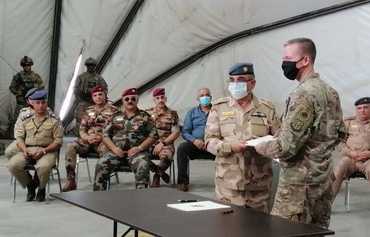The Iraqi Security Forces (ISF) are proving their ability to confront and combat "Islamic State of Iraq and Syria" (ISIS) sleeper cells through the success of the recent "Heroes of Iraq" military operation in Anbar province, analysts say.
The first phase of the "100% Iraqi" operation was held February 12th-14th and was considered an important test for Iraqi forces to demonstrate their combat capabilities.
Several branches of the ISF participated in the operation, including Border Patrol Units, and the Anbar, Baghdad, Al-Jazeera, Middle Euphrates and Salaheddine operations commands.
For the first time, Iraqi air defence units launched advanced missile batteries in the area of operations "to clear the sky for the Iraqi jets to conduct airstrikes against ISIS targets", the Joint Operations Command said in a statement announcing the operation.
![Iraqi officers from the 6th Army Division review operations to secure areas in western Baghdad from ISIS elements as part of the Heroes of Iraq security operation, in a photo published February 15th, 2020. [Photo courtesy of Iraqi Ministry of Defence]](/cnmi_di/images/2020/03/09/22764-iraq-heros-op-600_384.jpg)
Iraqi officers from the 6th Army Division review operations to secure areas in western Baghdad from ISIS elements as part of the Heroes of Iraq security operation, in a photo published February 15th, 2020. [Photo courtesy of Iraqi Ministry of Defence]
Momentum against ISIS 'unrelenting'
The operation was "100% Iraqi", Maj. Gen. Tahseen al-Khafaji, spokesperson for the Joint Operations Command, told Diyaruna.
"It was launched from five axes that included clearing terrorist cells from the western border of the country with Syria and Jordan", in addition to "targeting certain areas with security gaps where terrorist activities have been detected", he said.
The ISF "have proven their ability to manage such large scale attacks with a high level of efficiency by relying on their capabilities and expertise and, as a result, have achieved significant results," al-Khafaji said.
"This proves that our forces are in a good position and are operating at a high level of professionalism when confronting enemy elements to protect the security gains," he said.
The ISF secured more than 26,000 square kilometres of land, destroying five terrorist hideouts, 25 explosive devices and nine anti-tank missiles in addition to heavy artillery, mortars, shells and a range of munitions.
"The momentum of operations against terrorists is unrelenting and we will not give them the chance to create chaos, undermine security, and threaten the lives of people or take advantage of the current political situation and the protests in the country so they can once again expand," al-Khafaji said.
International coalition forces are taking an advisory and support role, while the ISF are taking the lead in anti-ISIS operations, he said.
The Iraqi Counter-Terrorism Service on February 25th led an operation in al-Khanouka mountains in the northern part of the country in which 39 ISIS elements were killed.
The dead include the official mufti for ISIS in Salaheddine province as well as the terrorist group's head of finance and logistical support.
"The coalition has contributed towards providing air cover for our forces as well as advice and information to carry out this significant mission that constituted a painful blow to ISIS," al-Khafaji said.
Joint efforts will continue to target terrorists and thwart their plans, he added.
ISF taking the lead
"The expertise of Iraqi forces has placed them in a leading position at the counter-terrorism level," security analyst Safaa al-Assam told Diyaruna.
"The Heroes of Iraq operation complements the Will of Victory operations [...] which proved to be successful in recent months in securing large swathes of territory in the western desert, al-Jazeera and in Diyala, Ninawa and Salaheddine provinces," he said.
The Will of Victory operations were carried out in eight phases, concluding at the end of December 2019 after clearing 32,000 square kilometres in western al-Jazeera.
"These operations have significantly cut down the number of ISIS elements and weakened their sources of financial and logistical support," he said.
"Our forces today have the full capacity to detect terrorists, hunt them down and destroy their hideouts, and have the necessary combat capabilities and preparedness that have developed during the battles to reclaim cities from ISIS," he said.
"The Iraqi forces also have an expansive database on ISIS and, through the Iraqi intelligence agencies, are able to thwart the plans of the group to make a comeback and its continuous efforts to spread its extremist ideology," he said.
Security analyst Fadel Abu Ragheef shared that sentiment.
"The Iraqi forces are at the top of the pyramid when it comes to fighting terrorism and now have leading combat and intelligence capabilities," he told Diyaruna.
"Thanks to these capabilities that were honed on the battlefield and through training, due to contributions from the international coalition, our forces are now sufficiently qualified to lead large scale and impactful operations," he said.

![Iraqi elite forces take part in an operation targeting ISIS hideouts in the Badoush mountains in Ninawa province in a photograph published February 14th, 2020. [Photo courtesy of Counter-Terrorism Service]](/cnmi_di/images/2020/03/09/22765-cts-iraq-heros-600_384.jpg)







Iraq is a strong country capable of fighting terrorism. However, there are some who leak Iraq’s plans under the pretext of protecting Iraq’s security. Nonetheless, I’m optimistic about Iraq and hopeful of a bright future. I pray to God to protect Iraq and to make me one of the heroic soldiers of Iraq to serve my dear country with all my power and love for my country and army. Hassan Jabr Mohammed, Iraq, Najaf.
Reply1 Comment(s)